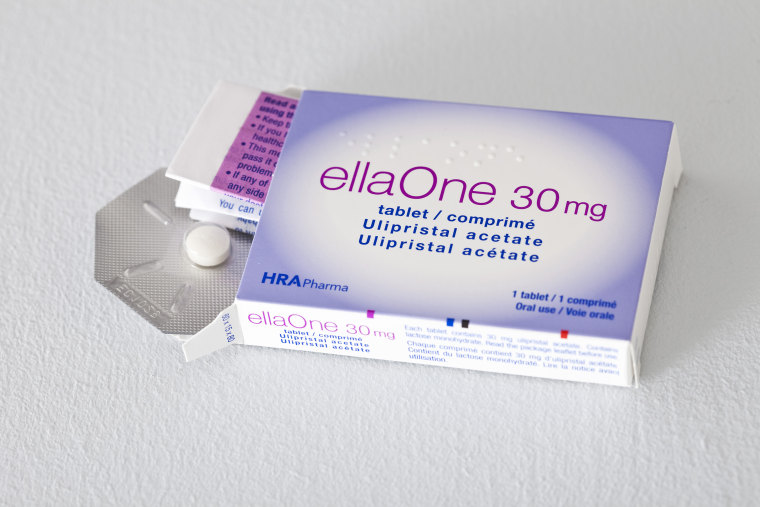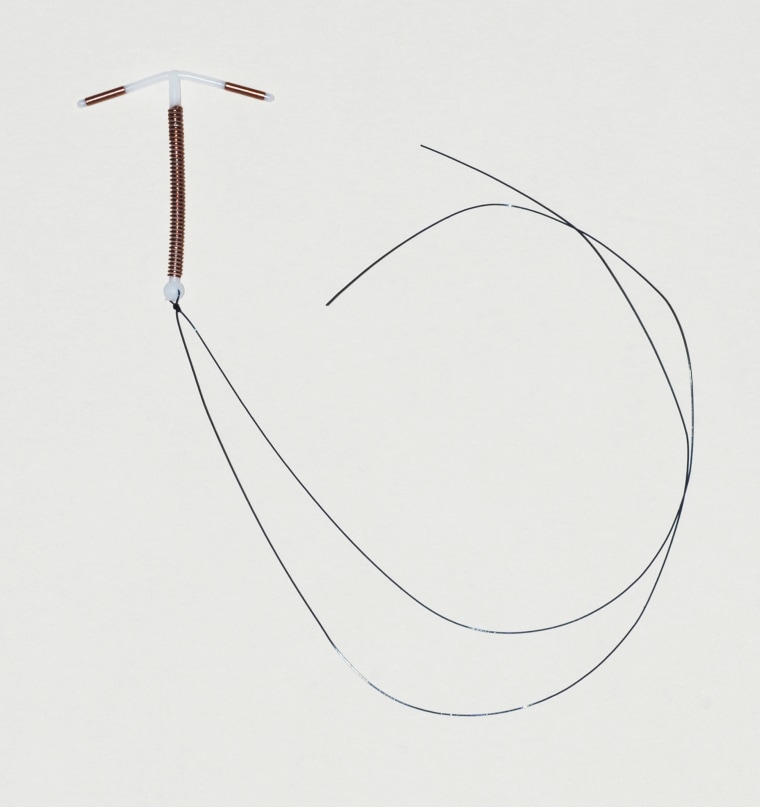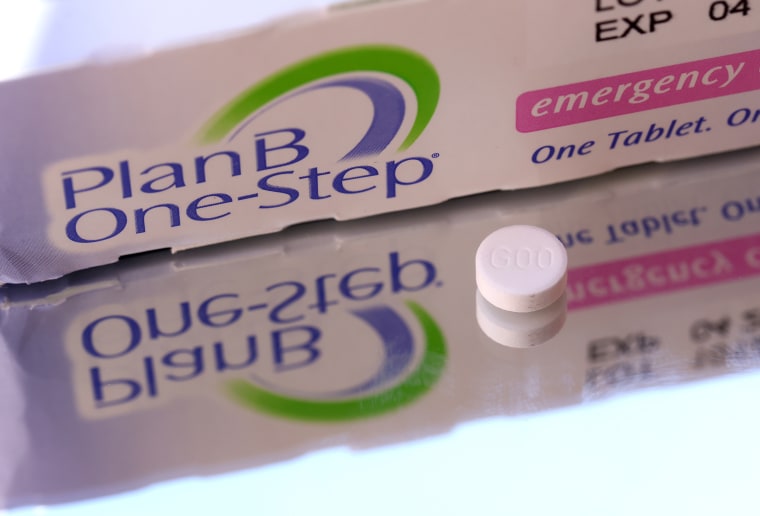Plan B, aka the morning-after pill, is a form emergency contraception that can prevent pregnancy after unprotected sex or when protection might've failed, while the abortion pill, aka medication abortion, is used to terminate an existing pregnancy.
But how is Plan B different from an abortion?
How does taking Plan B compare to an abortion?
Emergency contraception has long been confused with the abortion pill, aka medication abortion, even though they are very different, Dr. Paula Castaño, associate professor of obstetrics and gynecology at Columbia University, told TODAY. So no, Plan B is not the same as the "abortion pill" or having an abortion.
Emergency contraceptive pills work by inhibiting or delaying ovulation; the goal is to prevent pregnancy, so it will not work if someone is already pregnant, Castaño said. A medication abortion, which requires the patient to already be pregnant, is a different medication.
“A medication abortion — with either a combination of mifepristone and misoprostol or misoprostol only — is used to terminate an existing pregnancy, so after implantation,” Dr. Tania Basu Serna, associate clinical professor of obstetrics and gynecology at the University of California, San Francisco, told TODAY. “To be clear, Plan B is not the same as a medication abortion, and it does not interfere with implantation after it has occurred.”
Taking Plan B while pregnant will not cause an abortion or miscarriage, experts noted. Progestin, its main ingredient, can actually help sustain pregnancies early on, so the high dose in Plan B is not harmful, Castaño added.
“None of these (emergency contraceptives) are abortifacients, meaning they don’t disrupt a pregnancy,” Serna explained. “It does not have any impact on fertility or being able to conceive in the future. ... It’s very safe. That’s why it’s available over the counter.”
How does plan B work?
Plan B is an emergency contraceptive pill that contains only progestin, a synthetic form of the hormone progesterone, which helps regulate the menstrual cycle. “It’s basically a high dose ... to be accurate, 1.5 milligrams ... of a progestin called levonorgestrel,” Serna explained.
Although Plan B is often used synonymously with the term emergency contraception, “Plan B One-Step,” is actually a brand name. Levonorgestrel pills are also sold under the names Take Action, Aftera, Next Choice One Dose and more. These are available over-the-counter at most pharmacies without any age restrictions, according to Planned Parenthood.
Plan B works “by delaying ovulation or inhibiting ovulation ... depending on the timing of when you take the medication,” Serna explained.
Sperm can live in the body for up to five days after sex, according to Mayo Clinic, so if you would’ve started ovulating during that time, Plan B or a similar emergency contraception can reduce your chances of getting pregnant if you take it before that happens.
Ovulation occurs when the ovary releases a mature egg, which bursts out of an ovarian follicle. The levonorgestrel in Plan B works by decreasing levels of follicle-stimulating hormone (FSH) and luteinizing hormone (LH), which help stimulate ovulation.
“Basically, it delays the follicle from developing when it is administered before luteinizing hormone increases,” Serna said.
How effective is Plan B?
A 2014 systemic review of 14 studies on levonorgestrel-only emergency contraceptives in the peer-reviewed journal BMC Women's Health estimates that such medication is about 89% effective if used correctly within 72 hours of unprotected sex.
“It’s more effective the sooner you take it,” Dr. Christine Greves, a board-certified OB-GYN in Orlando, Florida, told TODAY.
If you take Plan B during or after ovulation, it may fail to prevent pregnancy, Serna said. The timing of ovulation varies from person to person, but the regular menstrual cycle is around 28 days and you ovulate on day 14, Greves said.
During ovulation, the egg travels to the fallopian tube, where it meets with the sperm if present, Serna added. “That’s typically where fertilization happens, and then implantation would be within the endometrial lining of the uterus of an intrauterine pregnancy.”
“Review of the evidence suggests that emergency contraception is unlikely to prevent implantation of a fertilized egg,” she continued, adding that once implantation has occurred, plan B would not affect the pregnancy.
“Regardless of where you are in your cycle, you should be able to take this pill, but the efficacy is dependent on when it’s taken, based on when ovulation occurs,” Serna stressed.
Emergency contraception is not meant to be used regularly because it's costly and not as effective as long-term birth control methods used consistently, Serna said. If you are using Plan B repeatedly, you may want to see your OB-GYN to explore your options.
“It is also important to stress that emergency contraception does not prevent sexually transmitted infections,” Greves said. So don’t forget to use condoms and get tested regularly.
What are the side effects of Plan B?
According to Greves, side effects of Plan B, which tend to be mild and go away on their own within a few days, include:
- Nausea
- Vomiting
- Fatigue
- Irregular bleeding
What are the other types of emergency contraception?
Another type of emergency contraceptive pill is ulipristal acetate, sold in the U.S. under the brand name Ella, per the National Library of Medicine. Unlike Plan B, Ella is non-hormonal and does require a prescription. It's a steroid but works similarly to Plan B by delaying or inhibiting ovulation.

“It is a little bit more effective (than Plan B) and can be used up to five days after an unprotected sexual intercourse,” Serna said. “Ella actually inhibits the follicle from rupturing even after the LH hormone has started to increase."
Ella may be the preferred oral emergency contraceptive for people who weigh more than 165 pounds, experts noted, as research shows BMI can impact effectiveness of Plan B. “We know levonorgestrel may be less effective in individuals who have a BMI of 25 or greater,” Serna said.
Although Ella has a longer time window than Plan B, the same advice applies around timing. “It’s best to take it as soon as possible to prevent ovulation,” said Greves.

Another form of emergency contraception, and the most effective, is the copper IUD, which prevents 99% of pregnancies if used within five days of unprotected sex, Castaño said. It works by preventing fertilization by affecting sperm viability and function, Serna added.
How does the abortion pill work?
The abortion pill, aka medication abortion, actually refers to two medications: mifepristone and misoprostol. This method is approved by the Food and Drug Administration to end a pregnancy through 10 weeks' gestation.
"You first take the mifepristone orally, by swallowing the pills, and then a set amount of time later, take the misoprostol pills by dissolving them between the cheek and gums, or inserting them vaginally,” Dr. Rebecca Miller, a pediatrician, psychiatrist and fellow with Physicians for Reproductive Health, previously told TODAY.
"The first, mifepristone, blocks the hormone progesterone. Progesterone is needed for a pregnancy to continue, and blocking progesterone starts the process of ending the pregnancy. The second medication, misoprostol, works by causing the uterus to contract and bleed, and push out the contents of the uterus, including the pregnancy tissue."
What are the side effects of the abortion pill?
The most common side effects of medication abortion are vaginal bleeding and cramping, according to Cleveland Clinic. Other side effects include:
- Nausea
- Vomiting
- Fever
- Chills
- Diarrhea
- Headache
How effective is the abortion pill?
How effective the abortion pill is depends on how far into your pregnancy you are, as it becomes less effective the longer you're pregnant, according to Planned Parenthood. That said, Cleveland Clinic estimates medication abortion is effective 98% of the time and works best in pregnancies prior to seven weeks of gestation.
Research also shows the abortion pill is safe, in addition to being effective: The U.S. mortality rate associated with giving birth is 14 times higher than the mortality rate associated with medication abortion, according to University of California, San Francisco's research program Advancing New Standards in Reproductive Health.
Miller also previously told TODAY that "serious complications that would require hospitalization happen in less than 1% of people who have a medication abortion. This is an enviable safety record compared to other medications or procedures."
Medication abortion via telemedicine is also safe up to week 10 of pregnancy, research shows. “We actually have a lot of data that shows telehealth abortion is just as safe and effective as medication abortion provided in person and that it increases access to care,” Dr. Nisha Verma, a fellow with the American College of Obstetricians and Gynecologists who specializes in complex family planning, previously told TODAY. (With the constitutional right to abortion having been overturned, telemedicine abortion will likely remain legal in about half of states, experts previously told TODAY.)
So, should you take the abortion pill or Plan B?
Just to reiterate: Plan B prevents pregnancy after unprotected sex, whereas medication abortion terminates an early pregnancy. But if you have any questions about either medication, their risks and side effects, or signs you need to seek follow-up care, talk to your health care provider.
